功能意念表
初中英语功能意念项目表

初中英语功能意念项目表————————————————————————————————作者:————————————————————————————————日期:2初中英语功能意念项目表功能问候提示回答Hi!Hello!Good morning/ afternoon / evening. How are you?Please say Hello to your parents. Please give my best love /wishes to Lucy.Hi!Hello!Good morning/ afternoon / evening.I’m OK. / fine, thanks. And you?/ very well, thank you.Sure. / all right功能介绍提示回答My name is Jim.I’m a student.I’m from England.This is Mr. / Mrs. /Miss/ Ms Brown. I’d like you to meet Bob.Hello.How do you do?Nice / glad / pleased to meet( see ) you.功能告别提示回答Good bye./ bye / Bye-bye.Good night.See you later/ then / tomorrow/ soon.I am sorry I have to go now.Good bye./ bye / Bye-bye.Good night.See you later/ then / tomorrow/ soon.功能感谢提示回答Thank you (very much). Thanks a lot.Thank you for your help. It’s very kind /nice of youThat’s OK /all right. You’re welcome. It’s a pleasure.3功能道歉提示回答Sorry.I’m sorry.Excuse me, please.I beg your pardon.I’m sorry (that ) I am late.That’s OK.It’s all right. Never mind.It doesn’t matter. It’s nothing.功能邀请提示回答Would you like to go for a walk?May I invite you to dinner?What / how about having a swimming?1.OK.Thank you.Yes, I’d love to.That would be nice.2.no, thank you.It’s very nice of you, but my mom is ill. I’d love to, but I have no time.I’m sorry I can’t .功能请示允许提示回答May I come in?Can / Could I use your telephone? Would /do you mind if I open the window?1.Yes, please.Sure.Certainly.That’s all right.Of course, you can.2.I’m sorry , it’s not allowed. I’m afraid not.You’d better not.功能祝愿和祝贺提示回答Have a good day/ time /journey/ trip. Good luck.Thank you. You, too.4Enjoy yourself.Best wish to you.Happy New Year.Merry christmas.Congratulations.Well done.The same to you.功能提供帮助提示回答Do you want me to clean the room? Can I help you?What can I do for you?Let me take your bag.1.yes, please.Yes, thanks.Thank you. That would be nice/ fine.Than you for your help2.No, thank you/ thanks.Thank you all the same.That’s very kind of you. But I can do it myself.功能约会提示回答Will you be free tomorrow?Do you have time this afternoon? How about tomorrow morning? When / where shall we meet? Could we meet at 4:30?Let’s make it 4;30.1.Yes, I’ll be free then.All right. See you then.2.I’m afraid I have no time then.Sorry , I won’t be free then, but I’ll be free tomorrow.功能打电话提示回答Hello. May I speak to Tom? Hello. I’d like to speak to Mr. Green.Is that kTom speaking?1234567,please.Can I leave a message?I’ll call back later /again.Hello. This is Tom speaking.Hello. Who is this?Hold the line, please.Just a moment, please.Hello. Who’s speaking?Sorry , he/ she isn’t here ri ght now.5I’ll ring him / her up again.Can I take a message?I’m afraid you have the wrong number.功能就餐提示回答Would you like something to eat/ drink?What would you like( to have)?Would you like some more rice?1. yes, I’d like a drink. I’d like rice and chicken.Just a little.Can I have some more soup? It’s so delicious, thank you.2.No, thank you.I’m full, thank you.功能就医提示回答What’s the matter?Do you have a fever?It’s nothing serious.Take the medicine three times a day. You’ll be all right/ well soon.I have a headache /cough /fever.I feel terrible /bad /awful.I don’t feel well.I can’t sleep well.功能购物提示回答Can / may I help you?What can I do for you?How many/ much would you like? What color /size/ kind would you like?What about about this one?I want / I’d like a pair of shoes. How much is it / are they?May I try it on? It’s too big / small.Sorry , it’s to expensive.Do you have any other colors /sizes /kinds? Two and a half kilos /pounds, please. That’s fine. I’ll take it.6功能问路提示回答Excuse me. Where’s the washroom?Can you tell me how to get to the post office? Excuse me. Which bus goes to world park? Excuse me. Which is the way to the bank of china? Excuse me. Could you tell me the way to the station, please?How can I get to No.4 middle school?It’s over there.It’s about 400 meters from here. Go down this street until you see thetall red building.Turn right /left at the first/ secondcrossing / corner.You can’t miss it.You can take bus No.3.You’d better take a taxi.2. Sorry, I don’t know, I;m new here.功能谈论天气提示回答What’s the weather like today?How’s the weather in Beijing?What a cold / hot day today! It’s a nice / fine /beautiful day today.It’s sunny/ cloudy/ windy/ rainy/ snowy/foggy.It’s getting cold / hot /warm/ cool.功能时间提示回答What’s the time, please?What time is it?When did you come to China? What time do you get up every day?It’s half past five./ twenty to nine.I came to China in 1998.I get up at 6 o’clock.功能时段提示回答How long have you been in this school? How long does it take you to get to school?When did you live in Beijing?How long have you been ill?I have been in this school for 3 years.It takes me 20 minutes by bike.I lived in Beijing from1996 to 1999.I have been ill since last Monday.7功能频率提示回答How often do you go to movies?I go to the movie once a week.I often go to movies.功能位置提示回答Where is the picture?It’s on /at /above /in /under /beside /near/behindthe table.He sits at the back of the room. The lab is in the center of the school.功能方向提示回答Which is the way to the station? Where is the train / bus going?Where are you going?Go down this street, and turn left /right at thefirst turning /crossing.The train is going to Xi’an.I’m going to the railway station.I’m leaving for Shanghai.功能距离提示回答How for is your school from here?It’s about 40 minutes by bike. It’s about 6 kilometers /miles away.功能存在提示回答Is there a bird in the tree? Are there any apples on the tree?What’s in the tree?Yes, there is /are .There’s a bird in the tree. There are many /a lot of birds in the tree.功能形状8提示回答What does it look like?It looks like a cat. It’s long /tall /short.功能颜色提示回答What color is the bag?It’s green / red /blue.功能形状提示回答What’s the table made of? What’s the wine made from?It’s made of wood. It’s made from grapes.功能价格提示回答How much is the dicionary?How much is it?How much are they?Is it cheap / expensive?It’s $25.They are $25.It costs me $25. It’s cheap/ expensive.功能规格提示回答What size is your sweater? What size shoes do you wear?The size of my sweater is XXL.It’s too big / small for me.功能形状提示回答How old are you? How old is he /she?I’m 18.He /she is 6 years old.功能长度提示回答9How long is the bridge?It’s about 400 meters /feet long.功能宽度提示回答How wide is the river?It’s about 200 meters wide.功能高度提示回答How tall /high is the building?It’s 130 meters tall/ high功能数量提示回答How many students are there in your class? How much water do you drink every day?There are 40 in our class.I drink 5 glasses of water every day.功能工作提示回答What do you do?What’s your job? What are you going to be?I’m a teacher /doctor/ worker/farmer. I’m going to be a scientist/ an engineer.功能原因提示回答Why are you late for school?Because I got up late this morning.功能工作单位提示回答Where do you work?I’m teaching in a high school.10。
大学法语的参考资料-功能意念表
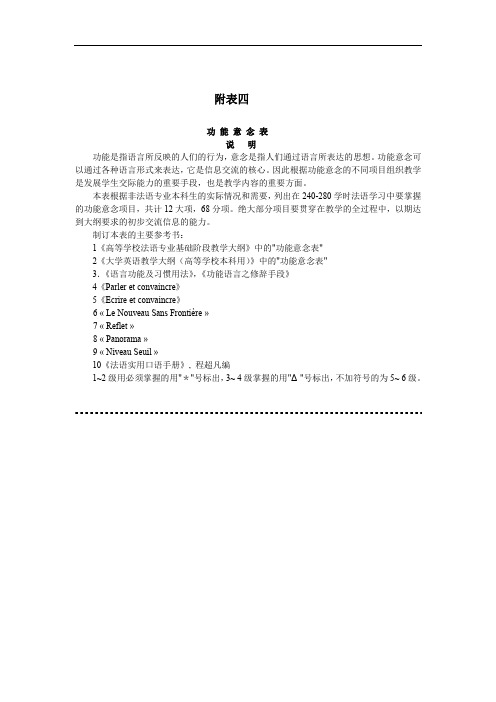
附表四功能意念表说明功能是指语言所反映的人们的行为,意念是指人们通过语言所表达的思想。
功能意念可以通过各种语言形式来表达,它是信息交流的核心。
因此根据功能意念的不同项目组织教学是发展学生交际能力的重要手段,也是教学内容的重要方面。
本表根据非法语专业本科生的实际情况和需要,列出在240-280学时法语学习中要掌握的功能意念项目,共计12大项,68分项。
绝大部分项目要贯穿在教学的全过程中,以期达到大纲要求的初步交流信息的能力。
制订本表的主要参考书:1《高等学校法语专业基础阶段教学大纲》中的"功能意念表"2《大学英语教学大纲(高等学校本科用)》中的"功能意念表"3.《语言功能及习惯用法》,《功能语言之修辞手段》4《Parler et convaincre》5《Ecrire et convaincre》6 « Le Nouveau Sans Frontière »7 « Reflet »8 « Panorama »9 « Niveau Seuil »10《法语实用口语手册》, 程超凡编1~2级用必须掌握的用"*"号标出,3~ 4级掌握的用"Δ"号标出,不加符号的为5~ 6级。
munications 交往1.1. saluer 问候* Bonjour. Bonsoir.* Salut.* Comment allez-vous?* Comment ça va?Très bien, merci. Et vous?Moi aussi, merci.* Ça va?* Ça va(pas mal), et toi?1.2. prendre congé告辞* Au revoir.* Salut.* A bientôt.* A tout àl'heure.* A demain.* A lundi.∆ Il est temps de me retirer.∆ Il faut que je m'en aille(vous quitte).Je suis désolé, mais il faut que je parte.1.3 . se présenter et présenter 自我介绍和介绍* Je m’appelle LI Min.* Je suis étudiant.* Mon nom est George Dupont.* C’est ma soeur Sophie.* Je vous présente Monsieur Dupont.∆ Permettez-moi de vous présenter Mademoiselle Louise Michel.∆ Enchanté (heureux) de faire votre connaissance.Très honoré.1.4. remerciements 感谢1.4.1. remerciements 感谢* Merci.* Merci de votre service.* Merci pour votre cadeau.* Merci beaucoup.* Je vous remercie (bien, de tout mon coeur, mille fois,...).* Vous êtes très gentil.∆ C'est très gentil de votre part.∆ Je vous remercie de votre aide.1.4.2. répondre àdes remerciements 答谢* De rien.* (Il n'y a) pas de quoi.* Je vous en prie.∆ A votre service.∆ Ce n'est pas grand-chose.1.5. souhaits 祝愿* soyez le bienvenu.* Bon succès.* Bonne chance.* A votre santé.Je vous souhaite une bonne santé.1.6. compliments 祝贺* Félicitations!* Toutes mes félicitations!* Tous mes compliments!* Bravo!∆ Je vous félicite.Tous mes voeux!Veuillez agréer mes meilleurs voeux pour(votre bonheur personnel, votre mariage,...)1.7. excuses 道歉1.7.1. faire des excuses 致歉* Excusez-moi.* Pardon.* Pardonne-moi.1.7.2. répondre àdes excuses 应答* Ça ne fait rien.* Je vous en prie.∆ Ce n'est rien.∆ Ce n'est pas grave.1.8. invitation 邀请1.8.1. inviter 邀请* Voulez-vous participer ànotre soirée?*Voudriez-vous dîner avec nous?* Je vous invute àdîner(au restaurant).∆ Si on allait faire un tour?1.8.2. consentir et refuser 接受和拒绝邀请* Avec plaisir.* Volontiers.* D'accord.* J'accepte.* Je veux bien.* C'est une bonne idée.∆ Je regrette, c'est impossible.∆ Ce sera pour une autre fois!1.9. proposition et demande 建议和请求1.9.1. proposition 建议* Je pense qu'il faut partir maintenant.* A mon avis, c'est le meilleur hôtel quartier.* D'après moi, M. Li doit rester àla maison.* Voudriez-vous(voulez-vous) prendre un bain?* Pourriez-vous(pouvez-vous) appeler Mme Simon?*On va au cinéma?* Je vous propose de participer àcette réunion.∆ Mon avis (opinion) est que nous passerons les vacances d'étéàla campagne.∆ Selon moi, nous allons prendre un taxi.∆ A votre place, j’irai là.∆ Je veux bien vous accompagner.∆ Il vaut mieux prendre le métro.1.9.2. demande 请求* Voulez-vous assister àvous demander.* Puis-je fumer?∆ Permettez-moi de prendre la parole.∆ Vous permettez?∆ J'ai un service àvous demander.1.9.3. rendre service 答应效劳* Volonriers.* Avec plaisir.* Naturellement.∆ Je suis àvotre service.∆ Je suis à votre disposition.∆ Je ferai tout mon possible.∆ Je le veux(peux) bien.1.9.4. refuser 拒绝效劳* Non, je ne veux (peux) pas.* Je suis désolé.∆ Malheureusement, je ne puis satisfaire votre demande.∆ Cela ne dépend pas de moi.∆ Je n'y peux rien.1.10. s'informer et informer 询问和告知1.10.1. s'informer 询问* Dites-moi, s'il vous plaît.* Expliquez-moi un peu (ce texte).* Voudriez-vous me dire un peu (en détail, en gros, ...) comment cela est arrivé?1.10.2. informer 告知* Ça, je le sais bien (peu).* On dit que la camarade Wang est rentrée hier.* Je sais qu'il est déjàparti.* Je peux vous dire qu'ils sont venus.* J'ai appris que le directeur était sorti.*Je sais que M. Wang est arrivé.*Quant àcela, je ne suis pas bien renseigné(informé).1.11. demander l'explication et s'expliquer 提问和解释* Je voudrais vous poser une question.* Cela veut dire...* Pouvez-vous me dire...* Savez-vous que...2. Attitudes 态度2.1. désir 意愿* Je veux un café.* J'ai envie d'un café.* J'ai besoin d'un dictionnaire.∆ Je désire qu'il sorte tout de suite.∆ Je voudrais que vous restiez plus longtemps.∆ Je préfère qu'il soit venu.∆ Il vaut mieux que cela soit ainsi.J'aimerais qu'il soit venu.* Nous espérons pouvoir parler français dans 6 mois.2.2. résolution 决心∆ Je me détermine àaller jusqu'au bout.∆ Ils sont résolus àpartir.∆ Ma résolution est prise.2.3. obligation 责任* Je dois l'aider.* Il est nécessaire de travailler dur.*Il faut faire ça.* Il me faut y aller.∆ Il est nécessaire que vous preniez cet avion.∆ Il faut que vous veniez àtemps.2.4. capacitéet incapacité有能、没有能力* Je (ne) sais (pas) le faire.* Je (ne) peux (pas) le faire.* C'est trop diffcile pour moi.∆ Je suis capable de faire cela.2.5. demander la permission et donner la permission 请求允诺和允诺2.5.1. demander la permission 请求允诺* Puis-je entrer?∆ Si vous permettez, je voudrais rentrer chez moi.Voulez-vous bien que je vienne?2.5.2. donner la permission 允诺* Mais, certainement.* Comme vous voudrez.* Si vous voulez, je vais faire mon possible.∆ C'est promis.Mais oui, je vous en prie.Vous pouvez compter sur moi.2.6. interdiction 禁止* Vous ne devez pas partir demain.* Défense de parler haut!* Il est interdit d'entrer!* Il ne faut pas fumer ici.* On ne doit pas être en retard.* On ne peut pas sortir.∆ Ce n'est pas permis.∆ C'est défendu (interdit).2.7. approuver et désapprouver 同意、不同意2.7.1. approuver 同意* Je suis tout àfait d'accord avec vous.* Vous avez raison.* Je suis pour.* Je ne suis pas contre.∆ C'est justement ce que je voulais dire.Absolument!2.7.2. désapprouver 不同意* Je ne suis pas d'accord.* Je suis contre.* Mais non.∆ Je ne suis pas de votre avis.2.8. affirmation, doute, négation 肯定、怀疑、否定2.8.1. affirmation 肯定* C'est ça.* Ça, c'est sûr (certain).* Je suis sûr et certain.∆ Bonne idée.∆ En effet (effectivement, exactement, justement, vraiment).∆ C'est juste.2.8.2. doute 怀疑* Je doute de ça.* Je ne le crois pas.∆ Vous ne vous êtes pas trompé?∆ C'est bien douteux.J'en doute beaucoup.A vrai dire, je n'y crois pas.Je ne crois pas qu'il vienne.2.8.3. négation 否定* Non, ce n'est pas vrai.* Mais non.∆ Je pense tout autrement que vous.∆ C'est votre opinion, ce n'est pas la mienen.∆ C'est un mensonge pur et simple.2.9. décision et indécision 决定和犹豫2.9.1. décision 决定* J'ai décidéd'aller àBeijing.∆ C'est décidé.Il est décidéque nous partons tout de suite.2.9.2. indécision 犹豫不决∆ On verra.∆ Dois-je rester ou partir? je ne suis pas encore décidé.∆ Je ne sais pas ce que je dois faire.2.10. encouragement 鼓励* Bon courage.* Du courage.* Allez-y.* Vas-y.Rassurez-vous, il n'y a pas de danger.Ne désespérez pas, tout s'arrangera.2.11. confiance et méfiance 信任和不信任∆ Je compte sur vous.∆ Vous pouvez avoir confiance sur moi.∆ Cela ne trompe personne.V ous croyez vraiment qu'il ne vienne pas?J'ai de la peine àcroire tout ce que vous dites.2.12. demander l'avis 征求意见* Comment trouvez-vous ce film?* Vous pensez qu'il part tout de suite?* Vous croyez qu'il est d'accord?* Quel est votre avis?* Quelle est votre opinion?∆ Qu'en pensez-vous?∆ Que pensez-vous de mon opinion?∆ Que dites-vous de son avis?A ma place, que feriez-vous?Que faut-il que je fasse?2.13. supposition 假设* S'il pleut, il ne sortira pas.* S'il pleuvait, il ne sortirait pas.S'il avait plu, il ne serait pas sorti.Supposons que ce fait soit vrai.Supposons que x est égal ày.2.14. possibilité可能性* C'est vrai?* Sans doute.* Jean est peut-être malade.* C'est possible.* Donnez-moi le plus de ses nouvelles possible.∆ Jean a l'air malade.∆ Il est possible que Jean soit malade.Il semble qu'il parte pour Beijing.2.15. conseil et suggestion 劝告和建议* Je pense (crois, trouve,...)* Je vous donne un bon conseil.∆ Si j'étais de vous, je n'hésiterais pas.∆ A votre place, voilàce que je ferais.2.16. mécontentement et reproche 不满与责备* Je suis fort mécontent de vous.* Comment avez-vous pu faire cela?* Pourquoi ne voulez-vous écouter mon conseil?* Vous avez (bien) tort!∆ Vous êtes capable de tout!∆ Vous perdez la tête.Détromtez-vous!Vous faites erreur!Ça vous servira de leçon!2.17. jugement 判断* Je tronve ça intéressant.* Je trouve que c'est terrible.* Je pense que c'est mauvais.* Cela est certain.* Je crois que c'est bon.Il est certain que nous réussirons.2.18. insistance 强调* C'est moi qui parle.* C'est lui qui a écrit ce livre.∆ Ce qui est important, c'est l'union des peuples.3. Emotion 感情3.1. inquiétude et crainte 担心和害怕3.1.1. inquiétude 担心* Je suis inquiet.∆ Comment faire?∆ Ça(cela) m'inquiète (beaucoup).3.1.2. crainte 害怕∆ Il a peur de sortir la nuit.∆ Il a peur de son père.∆ Nous avous peur qu'il ne vienne pas.∆ Je crains qu'il ne vienne.3.2. satisfaction et plaisir 满意和高兴* Je suis content de votre étude.* Oh, quel bonheur!* Quelle joie !* Je suis heureux(se) de faire votre connaissance.* C'est bon.* C'est parfait.∆ Que(comme, combien) je suis content(e).∆ Cela me plaît.∆ Comme c'est joli(e) !∆ J'ai le plaisir de vous faire part de cette vouvelle.∆ Cela me fait plaisir.∆ C'est satisfaisant.3.3. étonnement 惊奇* Tiens !* Je suis très étonnné.* C'est étonnant.* C'est incroyable.* Quel(le) temps (surprise, chaleur) !Je suis étonnéqu'il parle ainsi.3.4. intérêt, appréciation et admiration 爱好、赏识和欣赏3.4.1. intérêt 爱好* Qu'est-ce que vous aimez?* J'aime écouter la musique.* Je m'intéresse àce livre.J'adore la lecture des romans français.Je suis amareur de musique.Quel est votre goût?3.4.2. appréciation et admiration 赏识和欣赏* C'est admirable.* C'est magnifque.* Comme c'est beau !* Bravo !C'est extraordinaire.Que vous êtes jolie avec cette robe !J'admire les héros du perple.3.5. regret 遗憾∆ Je regrette.* C'est dommage.∆ Je regrette que tu ne puisses venir dimanche.∆ Je suis désolé.Je regrette d'avoir àquitter votre pays.C'est regrettable.3.6. indifférence 冷漠∆ Cela ne me regarde pas.Ce n'est pas mon affaire.Ça m'est égal.3.7. ennui 烦恼* Je suis triste.Je suis déçu.Je suis embarrassé.Cela m'ennuie.C'est ennuyeux.4. Existence et disponibilité存在、有和没有4.1. existence 存在* Il y a 25 personnes dans la classe.* Il n'y a pas d'étrangers parmi nous.∆ Il existe des difficultés dans notre travail.4.2. disponibilité有和没有* J'ai beaucoup de travail àfaire.* Je n'ai pas d'argent dans ma poche.5. Description d'espace 空间描述5.1. position 位置* sur, * sous, * devant, * derrière, * dans,* partout, * àcôtéde, * près de, * loin de, * en face de, * ici, * là-bas, * là∆ nulle part, * le long de, ∆ de tous côtés, ∆ audessus de, au-dessous de, * àdroite, * àauche* Ce village se trouve àl'est de Shanghai.5.2. direction 方向* à, * vers, * de, * envers, * àtravers, * arrière.* Vous tournez àgauche.* Vous allez tout droit.V ous prenez la première rue àdroite.5.3. distance 距离* loin de, * près de* La librairie est à300 mètres.∆ L'hôtel est àdix minutes d'ici.6. Temps 时间6.1. point de temps 时刻* au dîner, * àmidi, * àdix heures, * en classe, * le 12 avril∆àla fin, ∆ au début, au commencament6.2. durée 时段* pendant le week-end, * du matin jusqu'au soir,* pendant cinq jours, * en été, * toute l'année,* tous les marins, * depuis son départ.6.3. relation du temps 时间关系* d'abord, * et puis, * ensuite, * avant, * après,* autrefois, * maintenant, ∆ dans l'avenir, ∆ récemment, * dans deux mois,* il y a quatre joursÇa fait un mois que nous sommes àBeijing.6.4. fréquence 频度* rarement, * quelquefois, * parfois, * souvent,* jamais, * une fois par jour, * chaque fois, * tous les deux jours, fréquemment,...7. Quantité数量*7.1. nombre 数7.1.1. singulierpluriel7.1.2. chiffres7.2. quantité量* quelques, * certains, * plusieurs, ∆ tant de, ∆ autant de, * beaucoup de, * trop de, * peu de, * un peu de, * assez de∆ un nombre de, ∆ un grand nombre de, ∆ quantitéde, * bien de7.3. suffisance et exès 足量和过量7.3.1. suffisance 足量* C'est assez grand.La voiture bleue ne roule pas assez vite pour rattraper la voiture rouge.7.3.2. excès 过量* Cette soupe est trop chaude.Elle pense àtrop de choses.8. Mesure 计量8.1. mesure déterminée 定量* Je pèse 60 kilos.* Ce fleuve a une longueur de 1 000 km.Cette pièce mesure 14 mètres carrés.Cet arbre est haut de 8,50 mètres.8.2. approximation 近似* Il est près de midi.* Il y a environ deux ans.* Je rentre vers le soir.Il a approximativement 40 ans.8.3. moyenne 平均值∆ Nous travaillons en moyenne 8 heures par jour.Cette voiture roule àune moyenne de 60 km/h.8.4. proportion 比例la proportion de 20%L'augmenttation de la production industrielle est d'une proportion de 10%.8.5. maximum et minimum 最大值和最小值* au plus; * au moins, * au maximum, * au minimum∆ Le maximum de vitesse est 100km/h.Il faut achever ces travaus dans le minimum de temps.8.6. estimation 估计Le nombre des blessés est encore difficile àestimer.C'est une foule évaluée àcinq cents personnes environ.9. Calcul 计算9.1. addition, soustraction, multiplication, division 四则运算9.2. multiplication et pourcentage 倍数和百分比∆ Le riz représente 40% des exportations totales du pays.Un centimètre est 100 fois plus petit qu'un mètre.9.3. augmentation et diminution 增加和减少∆ Il y a 20% d'augmentation environ.Sa température est tombée de cinq dixième.10. Qualité质10.1. forme 形* carré, * rond∆ sphère, ∆ cube, ∆ triangle, ∆ rectangle10.2. couleur 色* blanc, * noir, * rouge, * bleu, * vert,* jaune, etc.∆ (rouge) foncé, ∆ (bleu) clair10.3. matière 材料∆ C'est une paire de chausettes en coton.∆ Il a acchetédeux lits de bois.11. Relation 关系11.1. relation contrastive 对比关系* d'une part..., d'autre part, ...* Les diffcultés ne nous intimident pas, au contraire, elles nous stimulent àles surmonter.Il marche vite au lieu qu'elle auance lentement.11.2. relation comparative 比较关系11.2.1. égalité相等* Il parle anglais aussi bien que français.∆ Il a autant de livres que moi.∆ C'est pareil.11.2.2. inférioritéet supériorité较低和较高* Sa voiture est moins chère qus ma voiture.* Il a moins de livres que sa soeur.* Elle marche plus vite que moi.* Fumez le moins possible.* Shanghai est la plus grande ville de la Chine.11.2.3. identité, ressemblance et différence 相同、相似与差异11.2.3.1. identité相同* C'est la même chose.* Il arrive le même jour que moi.∆ Je suis du même avis que vous.Je pense de la même manière.On ne peut pas faire autrement.11.2.3.2. ressemblance 相似* Le mur est blanc comme neige.∆ Sa bicyclette est pareille àla mienne.Ils se ressemblent comme deux gouttes d'eau.11.2.3.3. différence 差异* C'est différence* Mon opinion est tout autre.∆ Cela n'a rien de commun.Il a beau être riche, il n'est pas heureux.Leurs caractères sont complètement.11.3. relation possessive 所属关系* C'est le sac de ce monsieur.* C'est àvous.∆ Cela m'appautient.11.4. relation logique 逻辑关系11.4.1. cause et résultat 因果* Comme Paul est malade, il n'a pas pu venir.* Il ne peut pas faire ce voyage àcause de la chaleur.* Puisque tu ne le bois pas, je peux le prendre.* Il a oubliéson parapluie, parce qu'il était pressé.Il était tellement presséqu'il a oubliéson sac.11.4.2. buts 目的* Il marche vite afin de ne pas être en retard.Parlez plus fort pour que tout le monde vous entende.Je vous écris ceci, afin que vous sachiez la vérité.11.4.3. concession 让步∆ Bien qu'il fasse beau, je ne sortirai pas.Quoiqu'il soit malade, il est venu au travail.11.4.4. conjontion 连接* et, * ou, * mais, * car, * pour, * donc, * cependant, * ainsi, * encore11.4.5. addition, exception et restriction 增添、例外、限制11.4.5.1. addition 增添* Il est aussi étudiant.* Elle va au cinéma, moi aussi.∆ Il n'aime pas le café, moi non plus.11.4.5.2. exception 例外∆ Il y a vingt personnes dans la classe, le professeur non compris.∆ Tous les camarades sortent exceptéM.Li.11.4.5.3. restriction 限制* Je n'ai que deux frères.* Je suis seul àpenser ainsi.Il est le seul homme qui puisse m'aider.12. Argument 立论12.1. commencement 起始* Je commence par le commencement.* Commençons par le texte de la leçon 9.* Je parlerai (tout) d'abord de la situation internationale.* Nous parlerons premièrement du problème de la santépublique.12.2. développement 展开* Je parlerai ensuite de la situation du pays.* Puis, je parlerai de vos études.* Enfin, je parlerai du travail àfaire.* C'est-à-dire que vous restez ici jusqu-au soir.En plus, d'ailleurs.12.3. exemplification 例证* Nous avons visitéplusieurs villes, par exemple: Shanghai, Beijing, Wuhan, etc.∆ Je vais vous donner un exemple.∆ En voilàun exemple.Il a citéles paroles du président.12.4. conclusion 结论* En conclusion, nous devons développer plus vite notre écononie.La conclusion est que nous devons faire la réforme technique.Pour terminer, je parlerai de la protection de l'environnement.。
功能意念表

1.社会交往(Social Communications)(1)问候(Greetings)Hi /Hello!Good morning / afternoon / evening.How are you? / How are you doing? Fine, thanks, and you?Very well, thank you.(2)介绍(Introduction)My name is...I′m a student.I′m from England.This is Mr. / Mrs. / Miss / Ms. Brown.I′d like you to meet ...Nice / Glad / Pleased to meet (see)you. (3)告别(Farewells)Good-bye / Bye / Bye-bye.Good night.See you later / then / tomorrow / soon.I′m sorry I have to go now.(4)感谢(Thanks)Thank you (very much).Thanks a lot.Thank you for your help.It′s very kind / nice of you, but I can…You′re welcome.That′s OK / all right.I really appreciate your help!(5)道歉(Apologizes)I′m sorry.That′s OK.Never mind.(6)邀请(Invitation)Would you like to go for a walk?What / How about swimming? Yes, I′d love to.I′d love to, but I′m afraid …(7)请求允许(Asking for permission)May I come in ?Can / Could I use your telephone?Would / Do you mind if I open the window?Yes, please.Sure / Certainly / Of course.I′m afraid not.You′d better not.(8)祝愿和祝贺(Expressing wishes and congratulations)Have a good day / time / journey / trip!Good luck!Enjoy yourself!Happy New Year!Happy birthday to you!Congratulations!(9)提供帮助(Offering help)May / Can I help you ?Would you like me to help you?No, thanks.(10)约会(Making appointments)Will you be free tomorrow?Do you have time this afternoon?When / Where shall we meet ?Let′s make it 4:30.That would be fine!(11)打电话(Making telephone calls)Hello! May I speak to …?Is that … speaking?Who is speaking?Hello!This is …speaking.Just a moment / second, please.Sorry,I can′t hear you.(12)就餐(Having meals)Would you like something to eat / drink?Help yourself to some fish.What kind of juice would you like?(13)就医(Seeing the doctor)What′s the matter with you?Do you have a fever?How long have you been like this?Take this medicine three times a day.I have a headache / cough / fever.(14)购物(Shopping)What can I do for you ?What colour / size / kind would you like?That′s fine. I′ll take it.(15)问路(Asking the way)Excuse me. Where is…?Could you tell me the way to…,please?Which is the way to…?It′s about 400 meters from here.Turn right / left at the first / second crossing.You can′t miss it.Sorry, I don′t know. I′m a stranger here.(16)谈论天气(Talking about the weather)What′s the weather like today?How is the weather in …?It′s sunny / cloudy / windy / rainy / snowy / foggy. (17)语言交际困难(Language difficulties in communication)Pardon?I beg your pardon.Could you speak more slowly, please?I don′t know the word in English.(18)提醒注意(Reminding and warning)Don′t forget to ...Remember to ...Look out!Be careful!No smoking / spitting!(19)劝告(Advice)You′d better go to see the doctor.You should listen to and read English every day. You should wash your hands first.(20)建议(Suggestions)Let′s go and have a look.Why don′t you play with me?Why not go there yourself?What / How about having lunch with me?2.态度(Attitudes)(21)同意和不同意(Agreement and disagreement)All right.No problem.That′s a good idea.Yes, I think so.I don′t think so.(22)喜欢和不喜欢(Likes and dislikes)He′s interested in table tennis.I like / love / enjoy swimming, too.I′m fond of music.She doesn′t like it at all.(23)肯定和不肯定(Certainty and uncertainty)I′m sure.You′re sure of that.She′s sure that she′ll join us.I′m not sure whether / if she can come.Maybe / Perhaps you′re right.It′s hard to say.(24)可能和不可能(Possibility and impossibility)He can / may come today.She may not come so early.You can′t be in the office now.(25)能够和不能够(Ability and inability)He can / can′t ride a bike.He is / isn′t able to pass the exam.He is / isn′t good at football.(26)偏爱和爱好(Preference and hobbies)I prefer the old way.Which do you prefer , tea or coffee?I like English better / best.My favorite subject is physics.(27)意愿和打算(Intentions and plans)I′ll go with you.I′m going to visit my uncle this afternoon.He plans to go hiking.I want/would like to make a telephone call to her after class.(28)希望和愿望(Hope and wish)I wish / hope to become a doctor.(29)表扬和鼓励(Praise and encouragement)Very good! / Wonderful! / Excellent!Well done!Good job!3.情感(Emotions)(30)高兴(Happiness and pleasure)I′m pleased to know / hear that.(31)惊奇(Surprise)Really?I′m surprised to hear that.(32)忧虑(Worries)What′s wrong?What′s the matter? I′m worried about water pollution.(33)安慰(Reassurance)Don′t worry, you will be fine!Don′t be afraid.(34)满意(Satisfaction)Good / Perfect!(35)遗憾(Regret)I′m so sorry!I′m sorry to hear that.What a pity!That′s too bad!(36)恐惧(Fear)I′m afraid of that dog.4.时间(Time)(37)时刻(Point of time)What′s the time?What time is it?What time do you get up every day?When did you come to China?(38)时段(Duration)How long have you been in this school?It takes me twenty minutes by bike.I′ve been ill since last month / I came back . (39)频度(Frequency)How often do you go shopping?Once a week.Always / Usually / Often / Sometimes / Seldom / Never.5.空间(Space)(40)位置(Position)Where is the picture?It′s on / above / in / at / under / beside / near / behind the table.(41)距离(Distance)How far is your school from here?It′s about 40 minutes by bike.It′s about 6 kilometers / miles away (from here). 6.存在(Existence)(42)存在和不存在(Existence and non-existence)Look!There is / isn′t a bird in the tree.There are / aren′t many birds in the tree.7.特征(Features)(43)形状(Shape)What does it look like?It′s round / long / tall / short.(44)颜色(Colour)What colour is the bag?It′s red / yellow / orange / blue / green / black / brown / purple / white.(45)材料(Material)What is the table made of?What is the paper made from?The table is made of wood.The paper is made from wood.(46)价格(Price)How much is the dictionary?How much are they?The book costs me 100 yuan.It′s expensive / cheap.(47)年龄(Age)How old are you?I′m 16 (years old).8.计量(Measurement)(48)长度(Length)How long is the bridge?It′s 430 meters / feet long.(49)宽度(Width)How wide is the river? It′s about 200 meters wide.(50)数量(Number)How many students are there in your class?How much water do you drink every day?9. 比较(Comparison)(51)同级比较(Equal comparison)My ruler is as long as yours.I can′t run as / so fast as you.(52)差别比较(Comparative and superlative)Lily is younger than Kate.Tom is the tallest in his class / of all the boys.(53)相似和差别(Similarity and difference)Tom looks like his father.There are five differences between the two pictures.10. 逻辑关系(Logical relations)(54)原因和结果(Cause and effect)Why are you late for school?Why do you need three recycling bins?Because I got up late this morning.Because we recycle many things.11. 职业(Occupation)(55)工作(Job)What do you do ? / What does she/he do?What′s your job?I′m a teacher / doctor / worker / farmer / businessman / manager。
7 功能--意念教学大纲
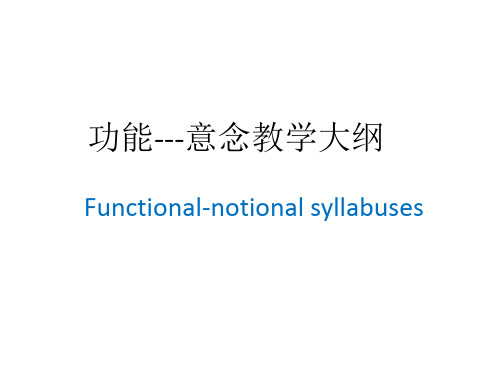
指导原理:(心理、社会)语言学和教育学
有真实的交际目的 输入 输出
特 点
学习形式:实际的学习任务 学习内容:真实的日常语言 用交际激发学习动机
用灵活的教学方法和材料 以螺旋式方式介绍语法、话题、文化等方面的内容
利于外语教学的广泛发展Fra bibliotek功能---意念教学大纲
Functional-notional syllabuses
功 能
意 念 教 学 大 纲
理论基础:功能、社会、心理语言学 强调语言功能(使用的目的) 和意念(语言表达的 概念、意义) 核心内容:使学习者会在什么情况下,对谁、用 什么方式说什么话
内容 特点
语言技能、项目
以交际目的为依据、确定学习的交际功能和意念 局 限 学习顺序的安排比语法项目的安排更困难 是结果性教学大纲 合理性,科学性,可行性
功能意念表

功能意念表1. 友好往来(1)问候Hello/Hi.Good morning/afternoon/evening, etc.(2)告辞I'm afraid I must be going now.I think it's time for us to leave now. I've really got to go now.It's time I went home.(3)告别Good-bye/Bye/Bye-bye. Good night.See you tomorrow.(4)介绍This is Tom (and this is Amy).I'd like you to meet Mary.May I introduce (you to) Mr./Mrs./ Miss/Ms. Smith? ②How do you do?Glad to meet you.Nice meeting you, Fred. ③(5)感谢和应答Thank you (very much).(Many ) thanks.I'm really grateful to you for your help. ③Not at all.You're welcome.Don't mention it.That's all right.(6)祝愿和祝贺Good luck!Best wishes for your holiday.Have a good time.Please give my best wishes to Linda. Please remember me to your family. ③Congratulations (on your success). ②(7) 道歉和应答Sorry.Excuse me. Never mind.It doesn't matter. That's nothing.(8)邀请和应答Come in and have a cup of tea.What about having a drink?Would you like some ice cream?Thank you (very much).Yes, I'd love to.That's very kind of you, (but I'm on a diet). ③(9)提议、接受和谢绝Can I help you?Is there anything I can do for you?Shall I carry the box for you?Yes, please.No, thank you (just the same).That's very kind of you, but I can manage it myself.③(10)开始和结束谈话③Nice day, isn't it?What a lovely day today!2. 交流补救(1)请求重复和解释Uh, excuse me, could you repeat it?Could you say that again?(2)定义③Linguistics may be defined as the science of language.(3)确认理解③Got it?Do you see what I mean? (4)犹豫③Let me see.How can I put it?(5)更正③What I meant was that we should go on with the work.(6)补充③In addition, I think we should take the cost into account.(7)插话③Excuse me. Did you say that the party had to be put off?3.态度(1)意愿I'm willing/ready to take the job.I will buy a new pair of glasses.(2)希望I wish to see you again.I hope you will get better soon.I wish I were younger. ③(3)意向I'm planning to move somewhere downtown.I feel like taking a hot bath now.(4)责任Do I have to finish it today?Should I look after the baby this evening?Is it necessary for me to clean the room? ③I'm afraid you must/will have to stay home. ③(5)能力I can manage the job without help.I'm capable of running a mile in four minutes. ③(6)允许I wonder if I could possibly use your bicycle? Sure, go ahead.I'd rather you didn't. ③(7)同意和不同意That's a good point.I'm afraid you're not quite right.(8)喜欢和不喜欢I like English poems very much. She loves doing shopping alone.He doesn't like wearing his hair long.I don't care much for hot food. ②(9)偏爱②I prefer tea to coffee.I'd rather go by train than by plane. (10)原谅It's not your fault.Please don't blame yourself. ③(11)后悔②I should have finished my essay earlier. (12)慰问和同情I'm so sorry.Please accept my deep sympathy. ②(13)兴趣That's quite tempting. ②I'm curious about that. ③(14)决心She's determined to go to Australia. ②I insist everybody be here at six sharp. ③Nothing will prevent me from accomplishing the task. ③(15)责怪和批评You are late again. ②Why didn't you tell me the truth? ②You shouldn't have done that. ③(16)抱怨I hate to have to say this, but it's too noisy here. ②(17)否定③I don't think you are right.(18)让步③Even so/But it's still a fact.(19)怀疑③I doubt if we can finish it on time.I suspect the truth of her statement.(20)犹豫③Well, let me see.(21)坚持③But you know that she's innocent.(22)忍受③Well, we just have to accept that sort of thing. (23)冷淡③I don't care what you do.It doesn't matter to me.4. 可能程度(1)肯定和不肯定I'm not quite sure whether it will rain today.I doubt if he knows the truth. ②to be sure/certain of ③(2)可能和不可能It is possible that he is out.It is unlikely that he should be at home. ②(3)预测It will be fine tomorrow.(4)猜测和相信I guess that he has got it.He must have read it before. We all believe that you are right.(5)看似、好象③He seems to be ignorant about it.5. 情感(1)惊奇What a surprise!I can hardly believe my ears/eyes.(2)满意和高兴It is well done.I'm pleased to know that. How wonderful!(3)愤怒或恼怒Isn't it annoying/irritating!What a stupid idiot! ②(4)悲伤Oh, no! How could this happen to me?I can't take much more of this.(5)愿望I wish I were young again.(6)悔恨和失望Oh, what a pity /shame!That's too bad.(7)需求I need your help.I want you to read this report.(8)焦虑I'm so anxious about my job. ③She is rather worried about his health.(9)加重感情色彩What a wonderful day! ②Thank you ever so much. ②It is far, far too expensive. ③(10)担心和挂念③I'm so worried about you.She is anxious to know the result.(11)害怕③Don't be afraid.I was frightened to death when a tall man ran towards me.(12)期望③I'm expecting a call.(13)赞赏③What a marvelous play!I like your haircut.6. 告戒(1)提醒Make sure you'll be there on time.Don't forget about your study.(2)请求Will you do me a favor?Would you mind helping me with the desk? ③(3)建议You'd better take an umbrella. I'd rather you did it again. ②Why don't you have a try? Let's take a short break. Shall we start now?(4)推荐I recommend this book.(5)指导The first thing you have to do is open the cover, and then don't forget to press the button 'ON'.(6)警告Be careful!Take care!If you don't do it properly, I'll make you do it again.(7)劝说Don't you think it would be better to leave right now? (8)命令Be quiet.Don't shout in the corridor.(9)禁止You can't smoke here.You are not allowed to smoke here.(10)许诺③I will pay you back next time.I give you my word that the goods will arrive on time.7. 时间(1)时刻She gets up at 7:00 every morning.The school will begin in September.(2)时段The concert lasted two hours.His father will stay in Paris for five years.(3)频度He should take the medicine twice a day.She usually wrote home every other week. ②(4)时序The cat ran here and there, first on this side, then on that side.(5)速度The students can read English at the speed of 200 words per minute. ③(6)同时Strike while the iron is hot. ③(7)持续The professor has been teaching at the university for over thirty years. ③8. 存在(1)存在和不存在Air exists nearly everywhere.There is not a soul in the room. ②(2)有和没有The people in this country enjoy free medical care.The factory ran out of raw material. ②9. 空间描述(1)位置He sits at the back of the room.The lab lies in the center of the university. ②(2)方向The post office is two blocks straight ahead.Turn left at the corner and go straightforward. (3)动向The train is leaving for Beijing.towards; from(4)距离The school is within walking distance.(5)体积③The two rooms are of the same size.The swimming pool is 25 meters in width, 50 meters in length and 2 meters in depth.10. 数量(1)数There are twenty students in the class.(2)量She has collected a great number of foreign stamps.There was a great amount of rain last month.(3)足量和不足量③They have ample food and clothing.The pot plant died from want of water.(4)过量The shirt is too large for Tom to wear.11.质(1)形状It is a U-shaped road.(2)颜色The leaves turn yellow in autumn.(3)材料The box is made of wood.(4)感觉③The blind man has to feel his way forward.He has no sense of music.(5)质地③The silk feels very smooth.(6)价值③ A peasant woman found a priceless stone in her land. (7)自然状况③I don't feel well, just because of the jet-lag.12. 方法和手段The sheets are usually folded in this way. ②He decided to treat the patient surgically. ③The dumb can make themselves understood by means of gestures. ③13. 功用The knife is used to cut things.The computer performs an important function in modern society. 14. 立论(1)例证The language skills, for example, speaking and writing, need to be practised.This relationship can be exemplified by the following graph. namely; as follows(2)概括Generally speaking, job chances are much better for manual workers than for office workers.(3)推论It is argued that books will no longer be necessary after each family owns a computer.(4)结论To sum up, it is no easy job to learn a foreign language. all in all; in conclusion; to conclude by saying…(5)阐明It means you mustn't overtake.15. 计算和测量③(1)基础运算If you multiply 3 by 4, you get 12.(2)倍数和百分比In this school, men constitute only 40% of the teaching staff.This book is twice as thick as that one.(3)增加和减少The export increased in volume by 10 percent over last year.There is a sharp drop of birth rate in this area.(4)基础测量(长、宽等)The table is four feet in length.The garden measures forty feet across.(5)近似值about; approximately(6)平均值On the average, the author writes two books a year.to have an average of(7)比率和比例16 to 8 is in ratio of 6 to 3.The proportion of A to B is X to Y.(8)最大值和最小值The train has the maximum speed of 250 miles per hour.The minimum number of students in each room will be five.(9)估计The estimated quantity of rice per acre is 5 tons. It is estimated that the work will take three months.16.结构③(1)部分和整体The committee comprises nine professors.Our class consists of 40 students.(2)部分之间的联系The staircase leads to the balcony. 17.关系③(1)行为中和事物中的联系They showed sympathy to the child.These facts are known by all the schoolteachers.(2)对比关系on the one hand…on the other hand…; in spite of; on the contrary(3)比较关系He speaks English as well as she does.He is the slower of the two children.That is the most wonderful play I have ever seen. (4)所属关系her promotion; a woman's college(5)逻辑关系As it was raining hard, we didn't go out yesterday. Nothing more was heard from him so that we began to wonder if he was dead.Though it was already midnight, he went on working. He failed the exam as a result of bad preparation.(6)分类English can be further divided into several sub-varieties.附录二语法项目表1、词类(1)名词(2)形容词(3)副词(4)动词(5)代词(6)冠词(7)数词(8)介词(9)连词(10) 惊叹词2、名词(1)可数和不可数名词(2)名词的复数形式(3)专有名词(4)所有格3、代词(1)人称代词(2)物主代词(3)反身代词(4)指示代词(5)不定代词(6)疑问代词(7)关系代词4、数词(1)基数词(2)序数词(3)分数③(4)小数③(5)百分比③5、介词6、连词7、形容词(1)形容词作定语、表语、宾语补足语(2)比较等级:原级/比较级/最高级8、副词(1)功能:表示时间、地点、方式、程度、关系等(2)比较等级:原级/比较级/最高级9、冠词10、动词(1)基本形式A.现在时B.过去时C.过去分词D.-ing形式(2)行为动词的及物性和不及物性(3)系动词:be, get, look, seem, turn, grow, become等(4)助动词:be, do, have, shall, will等(5)情态动词:can, may, must, ought to, need, dare等(6)时态A.一般现在时B.一般过去时C.一般将来时D.现在进行时E.现在完成时F.过去进行时②G.将来进行时H.将来完成时②I.一般过去将来时③J.现在完成进行时③K.过去完成进行时③L.过去完成时②(7)被动语态A.被动语态的不同时态·一般现在时·一般过去时·一般将来时②·现在进行时②·现在完成时②·过去进行时②·过去完成时②·将来完成时③·一般过去将来时③·过去将来完成时③B.带情态动词的被动语态(8)动词的非谓语形式A.不定式·作主语·作宾语·作宾语补足语·作状语·作定语②·作表语②·在复合结构中③·完成式、进行式和完成进行式③·被动形式③B.动词的-ed 形式②·作定语·作表语·作宾语补足语·作状语C.动词的-ing形式②·作主语·作宾语·作宾语补足语·作表语·作定语·作状语·在复合结构中③·完成形式和被动形式③(9)虚拟语气③11、句子(1)句子的成分(2)句子的种类(3)简单句的基本句型(4)并列句(5)复合句·名词性从句②(宾语从句1)·状语从句·定语从句②(6)倒装句②(7)省略句②(8)强调句③(9)插入语③12、标点符号13、构词法(1)转化(2)合成(3)派生A.常用前缀·表示“否定”:non-, un-, in-, dis-, im-③·表示“再次”re-·表示“互相”:inter-③·表示“中间”:mid-③·表示“错误地”:mis-③·表示“上,过度”:over-③·表示“下,低于”:under-③·表示“小”:mini-③·表示“多”:multi-③B.常用后缀·名词后缀:-er, -tion, -ese, -ist, -ing, -ment, -ness, -ian②, -or③, -ion③,-ation③, -ence③, -hood③, -ity③·动词后缀:-ify, -ize, -ise, -en·形容词后缀:-able, -ful, -y, -ive②, -al②, -an②, -ible③,-ic③, -ical③, -less③, -ous③·副词后缀:-ly·数词后缀:-teen, -ty, -th附录三语言技能表1、听力(1) 理解主旨要义;(2) 获取事实性的具体信息;(3) 理解明确表达的概念性含义;③(4) 进行有关的判断、推理和引申;③(5) 理解说话者的意图、观点或态度。
功能意念Unit 28 Explanation 解释
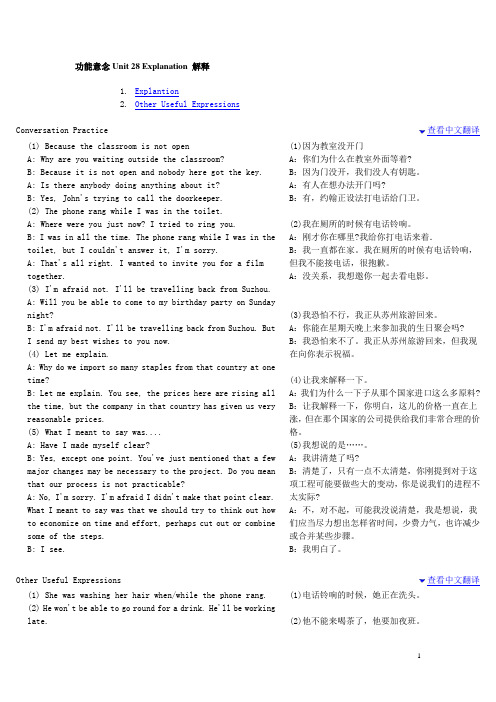
功能意念Unit 28 Explanation 解释1.Explantion2.Other Useful ExpressionsConversation Practice 查看中文翻译(1) Because the classroom is not openA: Why are you waiting outside the classroom?B: Because it is not open and nobody here got the key. A: Is there anybody doing anything about it?B: Yes, John's trying to call the doorkeeper.(2) The phone rang while I was in the toilet.A: Where were you just now? I tried to ring you.B: I was in all the time. The phone rang while I was in the toilet, but I couldn't answer it, I'm sorry.A: That's all right. I wanted to invite you for a film together.(3) I'm afraid not. I'll be travelling back from Suzhou. A: Will you be able to come to my birthday party on Sunday night?B: I'm afraid not. I'll be travelling back from Suzhou. ButI send my best wishes to you now.(4) Let me explain.A: Why do we import so many staples from that country at one time?B: Let me explain. You see, the prices here are rising all the time, but the company in that country has given us very reasonable prices.(5) What I meant to say was....A: Have I made myself clear?B: Yes, except one point. You've just mentioned that a few major changes may be necessary to the project. Do you mean that our process is not practicable?A: No, I'm sorry. I'm afraid I didn't make that point clear. What I meant to say was that we should try to think out how to economize on time and effort, perhaps cut out or combine some of the steps.B: I see. (1)因为教室没开门A:你们为什么在教室外面等着?B:因为门没开,我们没人有钥匙。
高中英语功能意念项目表
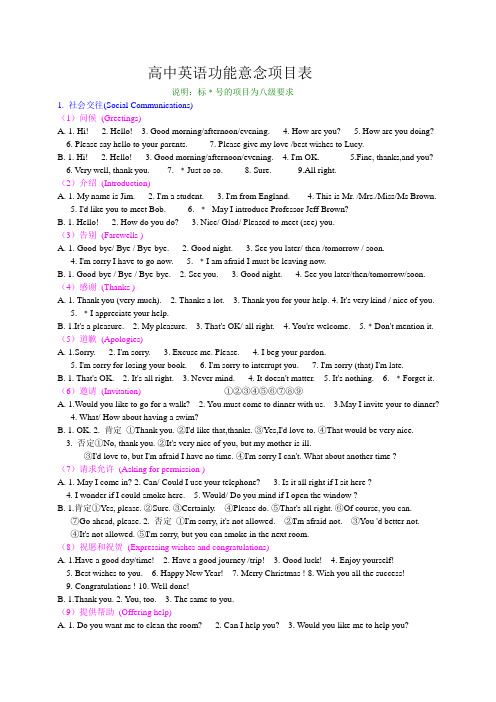
高中英语功能意念项目表说明:标﹡号的项目为八级要求1. 社会交往(Social Communications)(1)问候(Greetings)A. 1. Hi! 2. Hello! 3. Good morning/afternoon/evening. 4. How are you? 5. How are you doing?6. Please say hello to your parents.7. Please give my love /best wishes to Lucy.B. 1. Hi! 2. Hello! 3. Good morning/afternoon/evening. 4. I'm OK. 5.Fine, thanks,and you?6. Very well, thank you.7. ﹡Just so so.8. Sure.9.All right.(2)介绍(Introduction)A. 1. My name is Jim. 2. I'm a student. 3. I'm from England. 4. This is Mr. /Mrs./Miss/Ms Brown.5. I'd like you to meet Bob.6. ﹡May I introduce Professor Jeff Brown?B. 1. Hello! 2. How do you do? 3. Nice/ Glad/ Pleased to meet (see) you.(3)告别(Farewells )A. 1. Good-bye/ Bye / Bye-bye. 2. Good night. 3. See you later/ then /tomorrow / soon.4. I'm sorry I have to go now.5. ﹡I am afraid I must be leaving now.B. 1. Good-bye / Bye / Bye-bye. 2. See you. 3. Good night. 4. See you later/then/tomorrow/soon. (4)感谢(Thanks )A. 1. Thank you (very much). 2. Thanks a lot. 3. Thank you for your help. 4. It's very kind / nice of you.5. ﹡I appreciate your help.B. 1.It's a pleasure. 2. My pleasure. 3. That's OK/ all right. 4. You're welcome. 5.﹡Don't mention it. (5)道歉(Apologies)A. 1.Sorry. 2. I'm sorry. 3. Excuse me. Please. 4. I beg your pardon.5. I'm sorry for losing your book.6. I'm sorry to interrupt you.7. I'm sorry (that) I'm late.B. 1. That's OK. 2. It's all right. 3. Never mind. 4. It doesn't matter. 5. It's nothing. 6. ﹡Forget it. (6)邀请(Invitation) ①②③④⑤⑥⑦⑧⑨A. 1.Would you like to go for a walk? 2. You must come to dinner with us. 3.May I invite your to dinner?4. What/ How about having a swim?B. 1. OK. 2. 肯定①Thank you. ②I'd like that,thanks. ③Yes,I'd love to. ④That would be very nice.3. 否定①No, thank you. ②It's very nice of you, but my mother is ill.③I'd love to, but I'm afraid I have no time. ④I'm sorry I can't. What about another time ?(7)请求允许(Asking for permission )A. 1. May I come in? 2. Can/ Could I use your telephone? 3. Is it all right if I sit here ?4. I wonder if I could smoke here.5. Would/ Do you mind if I open the window ?B. 1.肯定①Yes, please. ②Sure. ③Certainly. ④Please do. ⑤That's all right. ⑥Of course, you can.⑦Go ahead, please. 2. 否定①I'm sorry, it's not allowed. ②I'm afraid not. ③You 'd better not.④It's not allowed. ⑤I'm sorry, but you can smoke in the next room.(8)祝愿和祝贺(Expressing wishes and congratulations)A. 1.Have a good day/time! 2. Have a good journey /trip! 3. Good luck! 4. Enjoy yourself!5. Best wishes to you.6. Happy New Year!7. Merry Christmas !8. Wish you all the success!9. Congratulations ! 10. Well done!B. 1.Thank you. 2. You, too. 3. The same to you.(9)提供帮助(Offering help)A. 1. Do you want me to clean the room? 2. Can I help you? 3. Would you like me to help you?4. What can I do for you?5. Let me take your bags.B. 1. 肯定①Yes, please. ②Yes, thanks. ③ Thank you. That would be nice/ fine.④Thank you for your help. 2. 否定①No, thanks /thank you. ②Thank you all the same.③That's very kind of you, but I can manage it my self.(10)接受或拒绝(acceptance and refusal)(11)约会(Making appointments )A. 1. Will you be free tomorrow ? 2. Do you have time this afternoon? 3. How about tomorrow morning?4. When/ where shall we meet?5. Could we meet at 4:30 ?6. Let's make it 4:30?7. What time is convenient for you ? 8. I'd like to make an appointment with Mr. Jones.B. 1.肯定①Yes, I'll be free then. ②All right. See you then.2. 否定①I'm afraid I have no time then. ②Sorry, I won't be free then. But I'll be free tomorrow. (12)打电话(Making telephone calls )A.1. Hello! May I speak to Tom? 2. Hello! I'd like to speak to Mr. Green. 3. Is that Liu Ying speaking?4. Extension six two two six, please.5. Can I leave a message ?6. I'll call back later /again.7. I'll ring him /her up again.B. 1.Hello! This is Mary speaking. 2. Hello, who is this? 3. Hold the line, please. 4. Just a moment, please.5. Hello, who's speaking?6. Sorry. He/ She isn't here right now.7. Can I take a message?8. Sorry. I can't hear you. 9. The line is bad/ busy. 10. I couldn't get through.11. Sorry, I'm afraid you have the wrong number.(13)就餐(Having meals)A.1. Would you like something to eat /drink? 2. What would you like ( to have)?3. Would you like some more fish?4. Help yourself to some fish.5. Which do you prefer, rice or noodles?6. What would you like to drink, tea or coffee?B. 1. 肯定①Yes, I'd like a drink. ②I'd like rice and chicken. ③ Just a little, please. ④Can I have some more soup? ⑤It's so delicious. Thank you. ⑥ I prefer noodles to rice. ⑦ I like green tea. 2. 否定①No, thank you. I've had enough. ② I'm full, thank you. ③It's very delicious, but I can't eat any more.; (14)就医(Seeing the doctor)A.1. What's the matter?2. What seems to be the trouble? 3. Do you have a fever?4. How long have you felt like this?5. It's nothing serious.6. Take this medicine three times a day.7. You'll be all right /well soon. 8. Give up smoking and keep on taking more exercises.B. 1. I have a headache / cough / fever. 2. I feel terrible / bad / horrible awful. 3. I don't feel well.4.I've got a pain here.5. It hurts here.6. I don't feel like eating.7. I can't sleep well.(15)购物(Shopping)A. 1. Can / May I help you? 2. What can I do for you? 3. How many /much would you like?4. What colour /size/ kind would you like ?5. What about this one?6. Here's your change.B. 1. I want / I'd like a pair of shoes. 2. How much is it / are they? 3. May I try it on ? 4. It's toobig/small. 5. Sorry, it's too expensive. 6. Do you have any other colors / sizes / kinds?7. Two and a half kilos / pounds, please. 8. That's fine. I'll take it. 9. Just have a look. 10. Well, I'll think about it. (16)问路(Asking the way)A.1. Excuse me. Where's the washroom? 2. Can you tell me how to get to the post office? 3. Excuse me. Which bus goes to World Park? 4. Excuse me. Which is the way to the Bank of China? 5. Excuse me. Could you tell me the way to the station, please ? 6. How can I get to No. 4 Middle School?B. 1肯定①It's over there. ② It's about 400 metres from here. ③ Go down this street until you see thetall red building. ④ Turn right / left at the first /second crossing/ corner. ⑤ you can't miss it.⑥ You can take bus No. 103. ⑦ You'd better take a taxi. 2.否定Sorry. I don't know. I'm a stranger here. (17)谈论天气(Talking about weather)A. 1.What's the weather like today? 2. How's the weather in Beijing? 3. What a cold / hot day today?4. It's a nice / fine/ beautiful / horrible day today.B. 1. It's sunny / cloudy /windy / rainy / snowy / foggy. 2. It's getting cool / cold / warm / hot.(18)语言交际困难(Language difficulties in communication)1. Pardon?2. I beg your pardon?3. I don't understand.4. Sorry, I can't follow you.5. ﹡Couldyou say that again, please? 6.﹡Could you repeat that, please? 6. Can you speak more slowly, please?7. ﹡What do you mean by killing time? 8. How do you say... in English? 9. I don't know how tosay that in English? 10. I don't know the world in English? 11. How do you spell it, please?12. I'm sorry I only know a little English.(19)提醒注意(Reminding)1. Don't forget your raincoat.2. Remember to lock the door.3. ﹡Make sure that all the windows are closed.4. Mind your head / step!5. No smoking!6. No spitting!7. Wet floor!8. Look out!9. Be careful! 10. Don't touch! 11.It's dangerous!(20)警告和禁止(Warning and prohibition)(21)劝告(Advice)1. You'd better go to see the doctor.2. You should listen to and read English everyday.3. You need to buya Chinese-English dictionary. 4. I f I were you, I'd phone him now. 5. Don't rush / hurry / push.6. Please stand in line.(22)建议(Suggestions)1. Let's go and have a look.2. Should we go now ?3. What / How about a picnic this Sunday?4. Why don't you buy a computer?5. Why not go to a movie ?2. 态度(Attitudes)(23)同意和不同意(Agreement and disagreement)A. 1. Sure. 2. Certainly. 3. Exactly. 4. That's correct. 5. Of course. 6. All right. 7. I agree.8.No problem. 9. That's a good idea. 10. Yes, I think so. 11. No way.B. 1. Of course not. 2. I don't agree. 3. I don't think so. 4. I'm afraid not.(24)喜欢和不喜欢(Likes and dislikes)A. 1. This book is very interesting. 2. I like / love the movie (very much ). 3. I like / love to playcomputer games. 4. I like taking photos. 5. I enjoy listening to music. 6. I'm interested in science.7. He is fond of music.B. 1. This song is bad / awful. 2. I don't like the movie very much / at all. 3. I don't enjoy collecting stamps.4. I hate to do homework.(25)肯定和不肯定(Certainty and uncertainty)A. 1. I'm sure. 2. I'm sure of that. 3. I 'm (quite) sure (that) she'll join us. 4. ﹡There is no doubt that it'smade of silk. 5.﹡It's clear that it will rain soon.B. 1. I'm not so sure. 2. I'm not sure of that. 3. I'm not sure whether / if she can come.C. 1. Maybe you're right. 2. Perhaps she is at home now. 3. It's hard to say.(26)可能和不可能(Possibility and impossibility)A. 1. He can / may come today. 2. It may snow tonight. 3. It's possible to finish the homework before6 o'clock. 4. It's likely to rain this afternoon. 5. It's likely that you will lose this game.B. 1. He may not come so early. 2. He can't be in the office now. 3. It's not likely to snow soon.4. It's impossible to finish my homework within one hour.(27)能够和不能够(Ability and inability)A. 1. He can ride a bike. 2. He's able to pass the math exam. 3. He is good at football.B. 1.He can't swim. 2. He's unable to walk any more. 3. She 's not good at swimming.(28)偏爱和优先选择(Preference)1. I prefer tea.2. Which do you prefer, tea or coffee?3.﹡I prefer tea to coffee.4. I'd prefer to go by train.5. I like English better / the best.6. My favourite subject is physics.7. ﹡I'd rather drink coffee than tea.8. ﹡Where would you rather go, London or Tokyo ?(29)意愿和打算(Intentions and plans)A. 1. I'll go with you. 2. I'm going to see my head teacher this afternoon. 3. I'd like to make a phone call toher after class. 4. I want / hope to find an English pen-friend. 5. I plan to go to Hangzhou this summer.6. We are ready to move to a new house.7. Bill intends to spend his vocation in California.8. I am thinking of driving to Beijing.B. 1. I won't see the movie again. 2. I'm not going to buy the book. 3. I don't want to live in the big city. (30)希望和愿望(Hope and wish)1. I wish to see you again.2. I hope to become a doctor.3. I hope it stays fine.4. I wish I were younger.5. I hope so.6. I hope not.(31)表扬和鼓励(Praise and encouragement)A. 1. Very good! 2. Well done! 3. Wonderful ! 4. Excellent! 5. You speak English very well.6. Your dress is beautiful!7. Come on!8. Keep trying!9. You can do it!B. 1. Thank you. 2. OK. I'll try it again.(32)责备和抱怨(Blame and complaint)1. He is to blame.2. She blamed him for coming home late.3. What do you mean by doing so?4. How could you cheat your teacher?5. He shouldn't have done it.6. Why didn't you tell me the truth?7. Why didn't you tell me the truth? 8. I'm sorry to have said that, but this room is too dirty.9. I hate to have to say this, but it's too noisy here. 8. Why don't you do something about it?(33)冷淡(Indifference)1. I don't care.2. I don't care what you do.3. It doesn't matte to me.4. I don't mind if you smoke.5. It's non of my business.(34)判断与评价(judgement and evaluation)A.3. 情感(Emotions)①②③④⑤⑥⑦⑧⑨(35)高兴(Happiness)1. How wonderful / nice!2. That's lovely / great / wonderful!3. I'm so happy.4. It's well done.5. I'm pleased to know that.(36)惊奇(Surprise)1. Really?2. Oh dear!3. Is that so?4. What a surprise!5. How nice to see you!6. How surprising!7. I'm surprised.8. It surprises me that your English is so beautiful.9. Does that surprise you? 10. Is this what you expected?(37)忧虑(Worries)1. What's wrong?2. What's the matter?3. Anything wrong?4. What should we do?5. Is something worrying you?6. Are you worried about your health?(38)安慰(Reassurance)1. There, there.2. Don't be afraid.3. Don't worry.4. It's (quite) all right.5. It'll be OK/ all right.(39)满意(Satisfaction)1. Good!2.Well done!3. Perfect!4. That's fine.5. That's better.6. That's good enough.7. I'm pleased with your spoken English.(40)遗憾(Regret)1. I'm so sorry!2. It's a great pity!3. What a shame!4. That's too bad!5. I wish I had never given it up.6. If I had been there, he would not have made such a serious mistake. (41)同情(Sympathy)1. I'm so sorry!2. I'm so sorry about your illness.3. I'm sorry to hear you are going away.4. Please accept my deep sympathy.(42)恐惧(Fear)1. Help!2. How terrible!3. I'm afraid of that dog.4. I'm frightened.5. You scared me!6. I dare not go out at night.(43)愤怒(Anger)1. Damn!2. Isn't it annoying!3. What a stupid idiot!4. 时间(Time)(44)时刻(Point of time)A. 1. Excuse me. What's the time, please? 2. Excuse me. What time is it? 3. Have you got the time?4. When did you come to China?5. What time do you get up every day?B. 1. It's half past five / twenty to nine. 2. I came to China in 1998. 3. I get up at 6 o'clock.(45)时段(Duration)A. 1. How long have you been in this school ? 2. How long does it take you to get to school?3. When did you live in Beijing?4. How long have you been ill?B. 1. I have been in this school for three years. 2. It takes me twenty minutes by bike.3. I lived in Beijing from 1996 to 1999.4. I have been ill since last Monday night.(46)频度(Frequency)A. How often do you go to movies?B. 1. I go to the movie once a week. 2. I often go to movies.(47)时序(Sequence)1. The cat ran here and there, first on this side, then on that side.2. What did you do next?3. Finally we found our way out.4. It rained even harder later on.5. 空间(Space)(48)位置(Position)A. Where is the picture?B. 1. It's on / at / above / in / under/ beside / near / behind the table. 2. He sits at the back of the room.3. The lab is in the center of the school.(49)方向(Direction)A. 1. Which is the way to the station ? 2. Where is the train / bus going? 3. Where are you going?4. Are you going up / down ?B. 1. Go down this street, and turn left / right at the first crossing. 2. The train is going go Xi'an.3. The train is going to the east / west / south / north.4. I'm going tko the railway station.5. I'm leaving for Shanghai.(50)距离(Distance)A. How far is your school from here ?B. 1. It's about 40 minutes by bike. 2. It's about 6 kilometers / miles away.6. 存在(Existence)(51)存在(Existence )A. 1. Is there a bird in the tree ? 2. Are there any apples in the tree ? 3. What's in the tree?B. 1. Yes, there is/ are. 2. There's a bird in the tree. 3. There are many / a lot of birds in the tree.(51') 不存在(non-existence)A. 1. Is there an English book in the schoolbag? 2. Are there any English books in the schoolbag?3. Isn't there any water in the bottle?4. Does water exist on the moon?B. 1. No, there isn't / aren't (any). 2. There isn't an English book in the schoolbag.3. There aren't any English books in the schoolbag.4. No, there's no water in the bottle.5. There's no more paper in the printer.6. No water exists on the moon.7. 特征(Features)(52)形状(Shape)A. 1. What does it look like? 2. What's the shape of the clouds?B. 1. It looks like a camel. 2. It's round / long / tall/ short. 3. It's a circle. 4. It's a U-shaped road. (53)颜色(Colour)A. What colour is the bag?B. 1.It's green / red / blue / yellow / black / white / orange / purple / light brown/ dark blue.2. I like the photo in black and white.(54)材料(Material)A. 1. What's the table made of? 2. What's the red wine made from?B. 1. It's made of wood. 2. It's made from grapes. 3. I bought a woollen sweater yesterday.(55)价格(Price)A. 1. How much is the dictionary? 2. How much is it? 3.How much are they? 4.Is it cheap/expensive?B. 1. The dictionary costs me 100 yuan. 2.The dictionary is expensive / cheap.(56)规格(Size)A. 1.What size is your sweater? 2. What size shoes do you wear?B. 1. The size of my sweater is XXL. 2. It's too big / small / long / short for me.(57)年龄(Age)A. 1. How old are you? 2. How old is he / she?B. 1. I'm eighteen. 2. He / She is six years old. 3. Uncle Wang is an old man.8. 计量(Measurement)(58)长度(Length)A. How long is the bridge?B. It's 430 metres / feet long.(59)宽度(Width)A. How wide is the river ?B. It's about 200 metres wide.(60)高度(Height)A. How tall / high is the building?B. 1. It's 130 metres tall / high. 2. The building has 85 floors / stories.(61)数量(Number)A. 1. How many students are there in your class? 2. How much water do you drink every day?B. 1. There are forty students in our class. 2. I drink five glasses of water every day.9. 比较(Comparison)(62)同级比较(Equal comparison)1. My ruler is as long as yours.2. I can run as fast as you can.3. This book is not as interesting as that one.4. I can't run so fast as you can.(63)差别比较(Comparative and superlative)1.Lily is younger than Kate.2. The red skirt is more expensive than the yellow one.3.I run faster than Jim.4. Mrs. Baker walks more slowly than Mr. Baker.5.Jim is the tallest in his class.6. Tom is the best of all. (64)相似和差别(Similarity and difference)1.This picture is the same as that one on the wall.2. Lucy is like her mother.3. Tom looks like his father.4. My picture is different from yours.5. There are five differences between the two pictures.10. 逻辑关系(Logical relations)(65)原因和结果(Cause and effect )A. 1. Why are you late for school? 2.How could you miss the train / plane?B. 1. Because I got up late this morning. 2. As he was ill, he couldn't come to school. 3.Since she did not feel well, she stayed at home. 4. Because of the bad traffic, we missed the train. 5. Due to the heavy fog, the planes were delayed. 6. The reason is that he is not careful enough in his work. 7. He ate too much, so he did not feel well. 8. It is so dark that I can not see anything in the room.(66)目的(Purpose)A. 1. Why are you here today? 2. Why did you do that?B. 1. I came here to see you off. 2. I did that in order to protect the trees.11. 职业(Occupation)(67)工作(Job)A. 1.What do you do? 2. What's your job? 3. What are you going to be?B. 1. I'm a teacher / doctor / worker / farmer/ businessman / manager.2. I'm going to be a scientist / computer engineer.(68)单位(Employer)A. 1. Where do you work? 2. What company are you working for?B. 1. I'm teaching English in a high school. 2. I'm working for a computer company.。
意念功能大纲
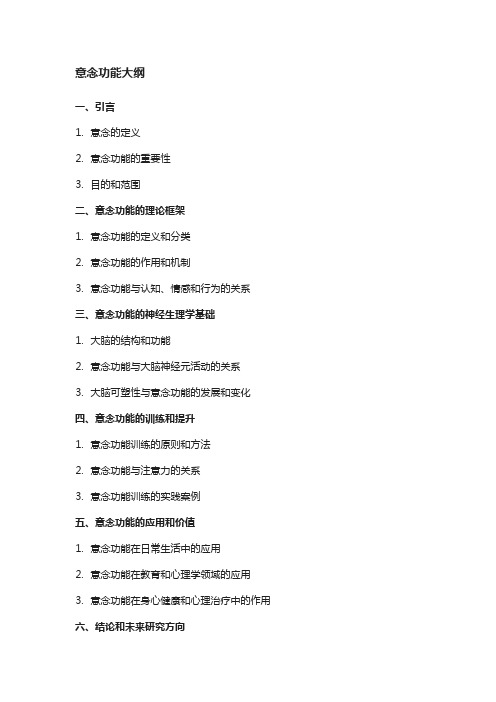
意念功能大纲
一、引言
1.意念的定义
2.意念功能的重要性
3.目的和范围
二、意念功能的理论框架
1.意念功能的定义和分类
2.意念功能的作用和机制
3.意念功能与认知、情感和行为的关系
三、意念功能的神经生理学基础
1.大脑的结构和功能
2.意念功能与大脑神经元活动的关系
3.大脑可塑性与意念功能的发展和变化
四、意念功能的训练和提升
1.意念功能训练的原则和方法
2.意念功能与注意力的关系
3.意念功能训练的实践案例
五、意念功能的应用和价值
1.意念功能在日常生活中的应用
2.意念功能在教育和心理学领域的应用
3.意念功能在身心健康和心理治疗中的作用
六、结论和未来研究方向
1.对意念功能的认识和理解
2.未来研究方向和挑战
3.对个人和社会的影响和意义。
语言的社会功能意义——关于《功能、意念表》的说明

语言的社会功能意义——关于《功能、意念表》的说明
功能、意念表是一个反映一定特定语言形式及其功能与意念的综合性量表,它有助于以一
种有系统及结构化的方式把握语言的功能及意念。
将一定范围的语言表达格式分隔其内部
的功能动机,逐一分析其中各类实物,情绪,活动类型的实体。
功能、意念表是用来说明语言结构特征及功能特征,把语言结构划分为三个层级,语言形
式、意念性功能与意想性功能,并且对不同层级中的抽象文法现象进行具体性解释。
同时,
此外,它还可以用来研究文化,法律,社会及政治等抽象性範略中语言形式功能及影响,
以及如何存在于不同的文化背景中。
这种量表可以让语言学家以一种更为严密的方式研究各种不同的语言表达形式,从而加深
理解每种语言的功能特征及社会功能。
功能、意念表可以让我们更清楚地理解语言的各种
功能,所以它具有重要的社会功能意义。
它既可以用来研究语言表达形式,也可以研究语
言与其他文化及领域之间的关系。
功能、意念表可以帮助我们更好地理解语言及其对文化
及国家社会制度的影响,从而加深对语言文化的认识。
人的意念能量值表
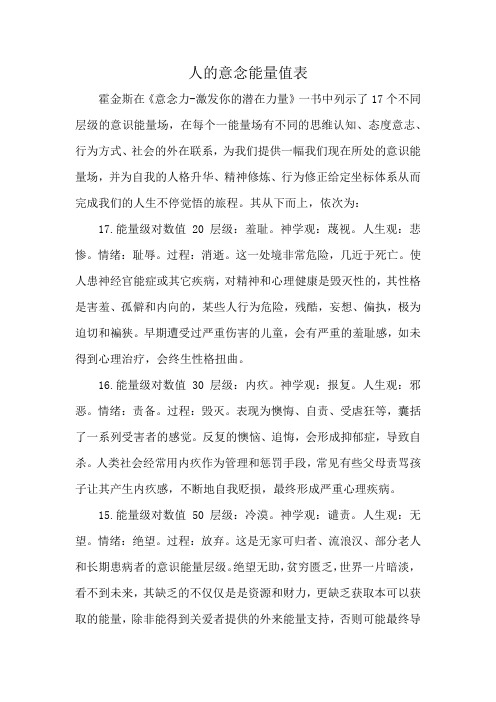
人的意念能量值表霍金斯在《意念力-激发你的潜在力量》一书中列示了17个不同层级的意识能量场,在每个一能量场有不同的思维认知、态度意志、行为方式、社会的外在联系,为我们提供一幅我们现在所处的意识能量场,并为自我的人格升华、精神修炼、行为修正给定坐标体系从而完成我们的人生不停觉悟的旅程。
其从下而上,依次为:17.能量级对数值 20 层级:羞耻。
神学观:蔑视。
人生观:悲惨。
情绪:耻辱。
过程:消逝。
这一处境非常危险,几近于死亡。
使人患神经官能症或其它疾病,对精神和心理健康是毁灭性的,其性格是害羞、孤僻和内向的,某些人行为危险,残酷,妄想、偏执,极为迫切和褊狭。
早期遭受过严重伤害的儿童,会有严重的羞耻感,如未得到心理治疗,会终生性格扭曲。
16.能量级对数值 30 层级:内疚。
神学观:报复。
人生观:邪恶。
情绪:责备。
过程:毁灭。
表现为懊悔、自责、受虐狂等,囊括了一系列受害者的感觉。
反复的懊恼、追悔,会形成抑郁症,导致自杀。
人类社会经常用内疚作为管理和惩罚手段,常见有些父母责骂孩子让其产生内疚感,不断地自我贬损,最终形成严重心理疾病。
15.能量级对数值 50 层级:冷漠。
神学观:谴责。
人生观:无望。
情绪:绝望。
过程:放弃。
这是无家可归者、流浪汉、部分老人和长期患病者的意识能量层级。
绝望无助,贫穷匮乏,世界一片暗淡,看不到未来,其缺乏的不仅仅是是资源和财力,更缺乏获取本可以获取的能量,除非能得到关爱者提供的外来能量支持,否则可能最终导致被动自杀。
以上三个层级,意识能量严重不足,需要接受专业心理治疗,政府与慈善机构、志愿者组织、爱心人士要提供帮助与干预,社会需要足够的重视与关爱。
14.能量级对数值 75 层级:忧伤。
神学观:轻视。
人生观:不幸。
情绪:悔恨。
过程:悲观。
这一水平是忧伤、丧气和意志消沉。
“忧伤”是生活的坟墓。
13.能量级对数值 100 层级:恐惧。
神学观:制裁。
人生观:可怕。
情绪:焦虑。
过程:退缩。
对于危险事物的恐惧是健康的,这世上大多数事物都是为恐惧所驱使,提供无穷无尽的动力。
关于大纲的“功能意念表”
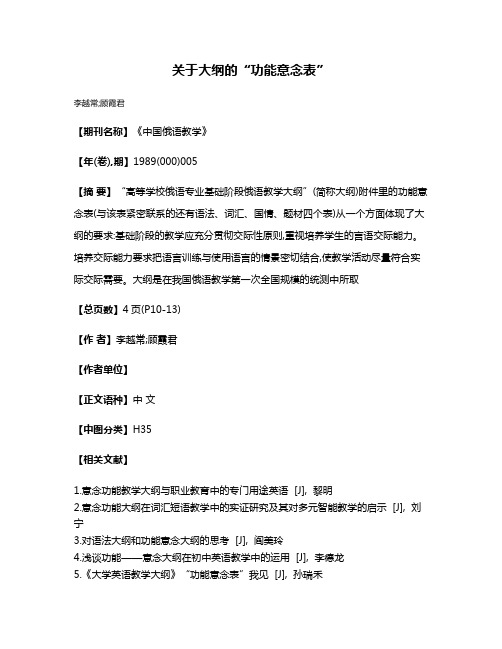
关于大纲的“功能意念表”
李越常;顾霞君
【期刊名称】《中国俄语教学》
【年(卷),期】1989(000)005
【摘要】“高等学校俄语专业基础阶段俄语教学大纲”(简称大纲)附件里的功能意念表(与该表紧密联系的还有语法、词汇、国情、题材四个表)从一个方面体现了大纲的要求:基础阶段的教学应充分贯彻交际性原则,重视培养学生的言语交际能力。
培养交际能力要求把语言训练与使用语言的情景密切结合,使教学活动尽量符合实际交际需要。
大纲是在我国俄语教学第一次全国规模的统测中所取
【总页数】4页(P10-13)
【作者】李越常;顾霞君
【作者单位】
【正文语种】中文
【中图分类】H35
【相关文献】
1.意念功能教学大纲与职业教育中的专门用途英语 [J], 黎明
2.意念功能大纲在词汇短语教学中的实证研究及其对多元智能教学的启示 [J], 刘宁
3.对语法大纲和功能意念大纲的思考 [J], 阎美玲
4.浅谈功能——意念大纲在初中英语教学中的运用 [J], 李德龙
5.《大学英语教学大纲》“功能意念表”我见 [J], 孙瑞禾
因版权原因,仅展示原文概要,查看原文内容请购买。
功能意念大纲
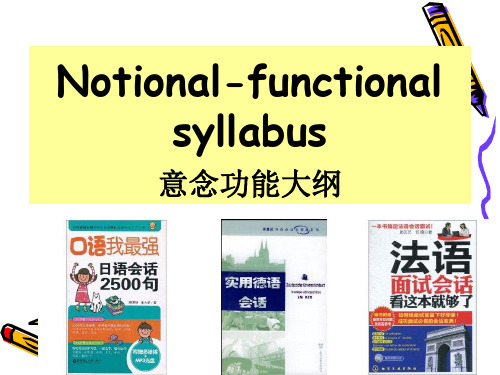
Distinguishing characteristic
• is its attention to functions as the organizing elements of a foreign language curriculum.
• Structure syllabus focus on grammar, and tend to highlight a grammatical features to the exclusion of practical application in real situation.
• notional-functional syllabuses Situations are devised to illustrate (显示,说明)grammar, instead of grammar illustrating a function, keys the students artificially(人为地) into grammatical categories that may later impede(阻碍) the communicative process. (P247 para3)
• For example, the "notion" of shopping requires numerous language "functions," such as asking about prices or features of a product and bargaining.
Structural syllabus & notionalfunctional syllabuses
PETS2听力必背词汇之英语听力功能意念表
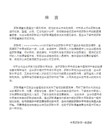
A: That's a good point.
B: I'm afraid you're not quite right.
(8) 喜欢和不喜欢
A: I like English poems very much.
She loves doing shopping alone.
Please remember me to your family.
B: Congratulations (on your success).
(7) 道歉和应答
A: Sorry.
Excuse me.
B: Never mind.
It doesn't matter.
(5) 感谢和应答
A: Thank you (very much).
(Many) thanks.
I'm really grateful to you for your help.
B: Not at all.
You're welcome.
It looks as if he knew a lபைடு நூலகம்t about it.
5. 情感
(1) 惊奇
What a surprise!
I can hardly believe my ears/eyes.
(2) 满意和高兴
It is well done.
I'm pleased to know that.
(8) 焦虑
I'm so anxious about my job.
She is rather worried about his health.
功能意念大纲的具体例子(一)
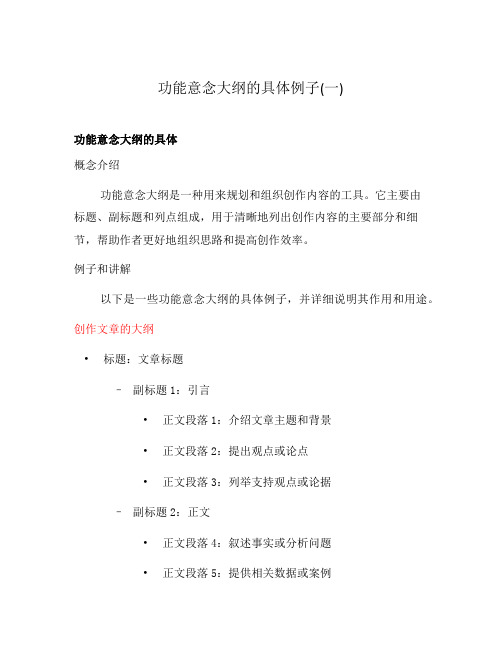
功能意念大纲的具体例子(一)功能意念大纲的具体概念介绍功能意念大纲是一种用来规划和组织创作内容的工具。
它主要由标题、副标题和列点组成,用于清晰地列出创作内容的主要部分和细节,帮助作者更好地组织思路和提高创作效率。
例子和讲解以下是一些功能意念大纲的具体例子,并详细说明其作用和用途。
创作文章的大纲•标题:文章标题–副标题1:引言•正文段落1:介绍文章主题和背景•正文段落2:提出观点或论点•正文段落3:列举支持观点或论据–副标题2:正文•正文段落4:叙述事实或分析问题•正文段落5:提供相关数据或案例•正文段落6:说明解决方法或建议–副标题3:结论•正文段落7:总结前文观点和重述论点•正文段落8:给出结论或建议•标题:参考资料–副标题1:书籍–副标题2:文章–副标题3:网站链接这个例子是一个用于写文章的大纲。
通过使用大纲的格式,作者可以清晰地划分文章的结构,从引言、正文到结论,确保文章逻辑严谨,并且可以方便地在每个部分添加细节和支持论据。
视频剧本的大纲•标题:视频剧本–副标题1:开场•列点1:介绍主要角色•列点2:设定背景和情境–副标题2:剧情发展•列点1:角色之间的冲突或互动•列点2:转折点和高潮部分•列点3:主要情节的展开和发展–副标题3:结局•列点1:结局事件的呈现•列点2:角色的情感和奋斗结局•列点3:给观众留下的思考或引发的情感•标题:场景设定–副标题1:内景场景•列点1:角色所在的具体场所和道具•列点2:环境元素和氛围的描写–副标题2:外景场景•列点1:角色所在的具体场所和背景•列点2:观众能够看到的元素和景色这个例子是一个视频剧本的大纲。
通过使用大纲的形式,作者可以清晰地规划剧本的结构和情节发展,同时在场景设定中详细列出每个场景的具体细节,帮助导演和演员更好地理解和呈现剧本中的情景。
结论功能意念大纲是一种非常实用的创作工具,可以帮助作者规划和组织创作内容,提高创作效率和整体质量。
通过合理运用大纲的形式,可以清晰地列出创作内容的主要部分和细节,帮助作者更好地组织思路并确定创作的方向。
功能意念项目表28页PPT

功能意念项目表
41、俯仰终宇宙,不乐复何如。 42、夏日长抱饥,寒夜无被眠。 43、不戚戚于贫贱,不汲汲于富贵。 44、欲言无予和,挥杯劝孤影。 45、盛年不重来,一日难再晨。及时 当勉励 ,岁月 不待人 。
ห้องสมุดไป่ตู้ 谢谢你的阅读
❖ 知识就是财富 ❖ 丰富你的人生
功能意念项目
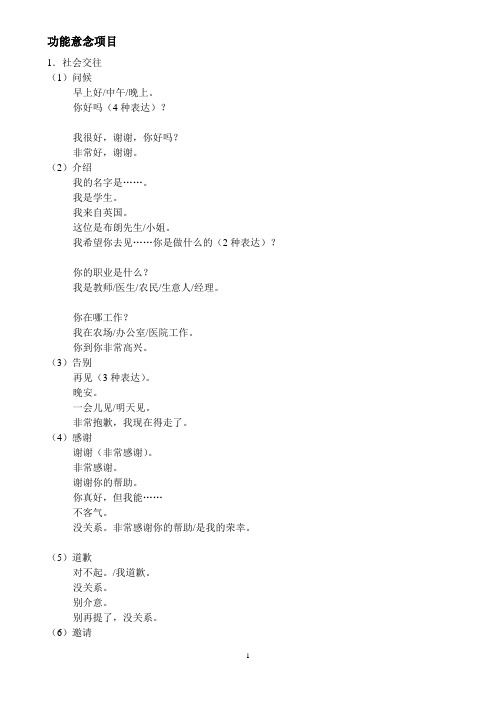
功能意念项目1.社会交往(1)问候早上好/中午/晚上。
你好吗(4种表达)?我很好,谢谢,你好吗?非常好,谢谢。
(2)介绍我的名字是……。
我是学生。
我来自英国。
这位是布朗先生/小姐。
我希望你去见……你是做什么的(2种表达)?你的职业是什么?我是教师/医生/农民/生意人/经理。
你在哪工作?我在农场/办公室/医院工作。
你到你非常高兴。
(3)告别再见(3种表达)。
晚安。
一会儿见/明天见。
非常抱歉,我现在得走了。
(4)感谢谢谢(非常感谢)。
非常感谢。
谢谢你的帮助。
你真好,但我能……不客气。
没关系。
非常感谢你的帮助/是我的荣幸。
(5)道歉对不起。
/我道歉。
没关系。
别介意。
别再提了,没关系。
(6)邀请你愿意一起散散步吗?游泳怎么样?是的,我愿意。
我很愿意,但恐怕……(7)请求允许我可以进来吗?我能用下电话吗?你介意我打开窗户吗?不介意,打开吧。
不介意(4种表达)。
恐怕不行。
最好别那么做。
(8)祝愿和祝贺玩得愉快/旅行愉快!祝贺你好运(2种表达)!玩得愉快!新年好!/你也是。
祝你生日快乐!祝贺你!(9)请求与提供帮助有什么能帮助你的吗?我能帮助你吗?/你能帮我一下吗?不,谢谢。
(10)约会明天有空吗?今天下午有空吗?我们什么时候(在哪儿)见面?4:30见面。
好的。
(11)打电话我能找……讲话吗?是……在讲话吗?谁在讲话?你好!我是……。
请等一会儿。
对不起,我听不清楚。
线路不通。
(12)就餐可以点菜了吗?你想吃什么?这是菜单。
你想吃/喝点什么?吃点鱼。
你想要什么样的果汁?味道非常好。
我付帐。
(13)就医你怎么了?你发烧了?你这种症状有多久了?一天吃三次这个药。
我头痛/咳嗽/发烧。
我脖子痛。
腿受伤了。
(14)购物能为你做点什么?我在寻找。
你喜欢什么颜色/尺码?我可以试穿吗?穿在你身上很好看。
你要多大尺码?S码。
好的,我买下了。
(15)问路打扰一下。
这是哪?你能告诉我去……怎么走吗?哪条路是去……?离这里大约400米。
- 1、下载文档前请自行甄别文档内容的完整性,平台不提供额外的编辑、内容补充、找答案等附加服务。
- 2、"仅部分预览"的文档,不可在线预览部分如存在完整性等问题,可反馈申请退款(可完整预览的文档不适用该条件!)。
- 3、如文档侵犯您的权益,请联系客服反馈,我们会尽快为您处理(人工客服工作时间:9:00-18:30)。
功能意念表1. 友好往来(1)问候 Hello/Hi. Good morning/afternoon/evening, etc.(2)告辞 I'm afraid I must be going now. I think it's time for us to leave now. I've really got to go now. It's time I went home.(3)告别 Good-bye/Bye/Bye-bye. Good night. See you tomorrow.(4)介绍 This is Tom (and this is Amy). I'd like you to meet Mary. May Iintroduce (you to) Mr./Mrs./ Miss/Ms. Smith? ② How do you do?Glad to meet you. Nice meeting you, Fred. ③(5)感谢和应答Thank you (very much). (Many ) thanks. I'm really grateful to you for your help. ③ Not at all. You're welcome. Don't mention it. That's all right. (6)祝愿和祝贺Good luck! Best wishes for your holiday. Have a good time. Please give my best wishes to Linda. Please remember me to your family. ③ Congratulations (on your success). ② (7) 道歉和应答Sorry. Excuse me. Never mind. It doesn't matter. That's nothing. (8)邀请和应答 Come in and have a cup of tea. What about having a drink? Would you like some ice cream? Thank you (very much). Yes, I'd love to.That's very kind of you, (but I'm on a diet). ③(9)提议、接受和谢绝 Can I help you? Is there anything I can do for you? Shall I carry the box for you? Yes, please. No, thank you (just the same). That's very kind of you, but I can manage it myself.③(10)开始和结束谈话③Nice day, isn't it? What a lovely day today!2. 交流补救(1)请求重复和解释Uh, excuse me, could you repeat it? Could you say that again? (2)定义③Linguistics may be defined as the science of language. (3)确认理解③ Got it? Do you see what I mean?(4)犹豫③Let me see. How can I put it? (5)更正③What I meant was that we should go on with the work. (6)补充③In addition, I think we should take the cost into account. (7)插话③Excuse me. Did you say that the party had to be put off? 3.态度(1)意愿 I'm willing/ready to take the job. I will buy a new pair of glasses.(2)希望 I wish to see you again. I hope you will get better soon. I wish I were younger. ③(3)意向I'm planning to move somewhere downtown. I feel like taking a hot bath now.(4)责任Do I have to finish it today? Should I look after the baby this evening? Is it necessary for me to clean the room? ③ I'm afraid you must/will have to stay home. ③(5)能力I can manage the job without help. I'm capable of running a mile in four minutes. ③(6)允许I wonder if I could possibly use your bicycle? Sure, go ahead. I'd rather you didn't. ③(7)同意和不同意That's a good point. I'm afraid you're not quite right.(8)喜欢和不喜欢I like English poems very much. She loves doing shopping alone. He doesn't like wearing his hair long. I don't care much for hot food. ②(9)偏爱②I prefer tea to coffee. I'd rather go by train than by plane. (10)原谅I t's not your fault. Please don't blame yourself. ③(11)后悔②I should have finished my essay earlier.(12)慰问和同情I'm so sorry. Please accept my deep sympathy. ②(13)兴趣T hat's quite tempting. ② I'm curious about that. ③(14)决心She's determined to go to Australia. ② I insist everybody be here at six sharp. ③ Nothing will prevent me from accomplishing the task. ③(15)责怪和批评You are late again. ② Why didn't you tell me the truth? ② You shouldn't have done that. ③(16)抱怨I hate to have to say this, but it's too noisy here. ②(17)否定③I don't think you are right.(18)让步③Even so/But it's still a fact.(19)怀疑③I doubt if we can finish it on time. I suspect the truth of her statement.(20)犹豫③Well, let me see.(21)坚持③But you know that she's innocent.(22)忍受③Well, we just have to accept that sort of thing. (23)冷淡③I don't care what you do. It doesn't matter to me.4. 可能程度(1)肯定和不肯定I'm not quite sure whether it will rain today. I doubt if he knows the truth. ② to be sure/certain of ③(2)可能和不可能It is possible that he is out. It is unlikely that he should be at home. ②(3)预测It will be fine tomorrow.(4)猜测和相信I guess that he has got it. He must have read it before. We all believe that you are right.(5)看似、好象③He seems to be ignorant about it. She appears to be unwilling to go. It looks as if he knew a lot about it.5. 情感(1)惊奇What a surprise! I can hardly believe my ears/eyes.(2)满意和高兴It is well done. I'm pleased to know that. How wonderful! (3)愤怒或恼怒Isn't it annoying/irritating! What a stupid idiot! ②(4)悲伤Oh, no! How could this happen to me? I can't take much more of this.(5)愿望I wish I were young again.(6)悔恨和失望Oh, what a pity /shame! That's too bad.(7)需求I need your help. I want you to read this report.(8)焦虑I'm so anxious about my job. ③ She is rather worried about his health.(9)加重感情色彩What a wonderful day! ② Thank you ever so much. ② It is far, far too expensive. ③(10)担心和挂念③I'm so worried about you. She is anxious to know the result.(11)害怕③Don't be afraid. I was frightened to death when a tall man ran towards me.(12)期望③ I'm expecting a call.(13)赞赏③ What a marvelous play! I like your haircut.6. 告戒(1)提醒M ake sure you'll be there on time. Don't forget about your study.(2)请求Will you do me a favor? Would you mind helping me with the desk? ③(3)建议You'd better take an umbrella. I'd rather you did it again. ② Why don't you have a try? Let's take a short break. Shall we start now?(4)推荐I recommend this book.(5)指导The first thing you have to do is open the cover, and then don't forget to press the button 'ON'.(6)警告B e careful! Take care! If you don't do it properly, I'll make youdo it again.(7)劝说D on't you think it would be better to leave right now? (8)命令B e quiet. Don't shout in the corridor.(9)禁止Y ou can't smoke here. You are not allowed to smoke here.(10)许诺③I will pay you back next time. I give you my word that the goods will arrive on time.7. 时间(1)时刻She gets up at 7:00 every morning. The school will begin in September.(2)时段The concert lasted two hours. His father will stay in Paris for five years.(3)频度He should take the medicine twice a day. She usually wrote home every other week. ②(4)时序The cat ran here and there, first on this side, then on that side.(5)速度The students can read English at the speed of 200 words per minute. ③(6)同时Strike while the iron is hot. ③(7)持续The professor has been teaching at the university for over thirty years. ③8. 存在(1)存在和不存在Air exists nearly everywhere. There is not a soul in the room. ②(2)有和没有The people in this country enjoy free medical care. The factory ran out of raw material. ②9. 空间描述(1)位置He sits at the back of the room. The lab lies in the center of the university. ②(2)方向The post office is two blocks straight ahead. Turn left at the corner and go straightforward.(3)动向The train is leaving for Beijing. towards; from (4)距离The school is within walking distance.(5)体积③The two rooms are of the same size. The swimming pool is 25 meters in width, 50 meters in length and 2 meters in depth.10. 数量(1)数There are twenty students in the class.(2)量 She has collected a great number of foreign stamps. There wasa great amount of rain last month.(3)足量和不足量③ They have ample food and clothing. The pot plant died from want of water.(4)过量The shirt is too large for Tom to wear. 11.质(1)形状It is a U-shaped road. (2)颜色The leaves turn yellow in autumn. (3)材料The box is made of wood. (4)感觉③ The blind man has to feel his way forward. He has no senseof music.(5)质地③ The silk feels very smooth.(6)价值③ A peasant woman found a priceless stone in her land.(7)自然状况③ I don't feel well, just because of the jet-lag.12. 方法和手段The sheets are usually folded in this way. ② He decided to treat the patient surgically. ③ The dumb can make themselves understood by means of gestures. ③13. 功用The knife is used to cut things. The computer performs an important function in modern society.14. 立论(1)例证 The language skills, for example, speaking and writing, need to be practised. This relationship can be exemplified by the following graph. namely; as follows(2)概括 Generally speaking, job chances are much better for manual workers than for office workers.(3)推论 It is argued that books will no longer be necessary after each family owns a computer.(4)结论 To sum up, it is no easy job to learn a foreign language. all in all; in conclusion; to conclude by saying …(5)阐明It means you mustn't overtake. 15. 计算和测量③(1)基础运算 If you multiply 3 by 4, you get 12.(2)倍数和百分比 In this school, men constitute only 40% of the teaching staff. This book is twice as thick as that one.(3)增加和减少 The export increased in volume by 10 percent over last year. There is a sharp drop of birth rate in this area.(4)基础测量(长、宽等) The table is four feet in length. The garden measures forty feet across.(5)近似值about; approximately (6)平均值 On the average, the author writes two books a year. to havean average of(7)比率和比例 16 to 8 is in ratio of 6 to 3. The proportion of A to B is X to Y.(8)最大值和最小值The train has the maximum speed of 250 miles per hour. The minimum number of students in each room will be five. (9)估计 The estimated quantity of rice per acre is 5 tons. It isestimated that the work will take three months.16.结构③(1)部分和整体 The committee comprises nine professors. Our class consists of 40 students.(2)部分之间的联系 The staircase leads to the balcony.17.关系③(1)行为中和事物中的联系They showed sympathy to the child. These facts are known by all the schoolteachers. (2)对比关系on the one hand … on the other hand …; in spite of; on the contrary (3)比较关系 He speaks English as well as she does. He is the slower of the two children. That is the most wonderful play I have ever seen.(4)所属关系her promotion; a woman's college (5)逻辑关系 As it was raining hard, we didn't go out yesterday. Nothing morewas heard from him so that we began to wonder if he was dead. Though it was already midnight, he went on working. He failed the examas a result of bad preparation.(6)分类 English can be further divided into several sub-varieties.。
